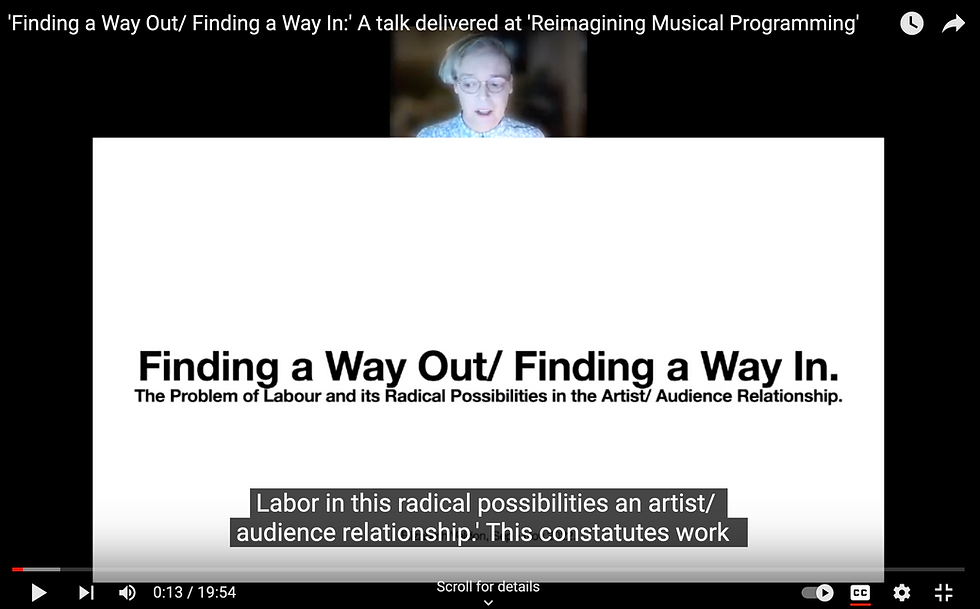‘How could we sing the Lord’s song in a foreign land’
- blackcirclerecords
- Nov 21, 2022
- 3 min read

(Image description: a black square.)
I wrote this short piece two years ago and counting but I think it still has relevance today in the wake of a mass shooting targeting the queer community while they gathered to remember the dead on trans day of remembrance. Partly I wanted to rescue this for the relative obscurity of my old Medium account, partly I think it is still relevant and not only to queer people but to all oppressed people who wish to speak out against their oppression..
The full title of this piece is: ‘How could we sing the Lord’s song in a foreign land:’ the ownership of trans narratives and the violence of their oppression.'
I often find myself, as a Christian, returning to Psalm 137 when faced with the anger of others. This psalm is more widely known for its elegiac tone than for it’s actual content:
By the rivers of Babylon - There we sat down and there we wept When we remembered Zion.
It is not this i remember the psalm for and why I return to it.
Yesterday i discovered that the Independent journalist and Medium contributor Gemma Stone had been doxed and her information passed on to sites where she would be cyberstalking (see here) and i was reminded of why I love and return to Psalm 137 so much.
2.
‘How could we sing the Lord’s song in a foreign land.’
In a now deleted post Debbie Hayton, a noted anti-trans campaigner, argued that Gemma had asked for this because she didn’t supply her personal details and it was therefore open season on her identity.
We could talk here about victim blaming or we could say that Debbie Hayton feels that Gemma’s narrative belonged to her, that Gemma belonged to her body and soul and if she refused to submit to this then she would be forced to do so.
Gemma’s narrative became the property of those who oppress her and those like her and though I have not saw any Gender Critical Feminists support Debbie I have saw none condemn her.
3.
‘O daughter Babylon, you devastator! Happy shall they be who pay you back What you have done to us!’
It wasn’t only Gemma silenced today.
The journalist Owen Jones highlighted the case of a young Trans Man who the trans hate group Object misgendered in death and we where treated to Cis commenters telling us that ‘there is negativity on both sides.’ If we are to have our narrative and even our names taken from us in death then are we not the refugees of the Psalm remembering Zion?
We, by the long way round, return to what I treasure in Psalm 137 and why I return to it again and again.
4.
‘Happy shall they be who take your little ones And dash them against the rock!’
When the oppressed speak they do not speak with the language of the drawing room or the debating chamber, they do not use polite forms or logical arguments. The voice of the oppressed is a cry to the heavens and, to the oppressor, looks like violence. To the oppressed it is the soul crying out for freedom.
The oppressor must always turn to the oppressed and criticise their language, show how shocked they are at the violence within their cries for justice.
Let us return to the Psalm again: when you read the final lines who do you find the most objectionable — those who wish for bloody revenge against their oppressors or those who oppress them?
Gemma has been silenced, a child’s death has been cheapened by bigotry and hate ‘how could we sing the Lord’s song in a foreign land?’
The great Liberation Theologist Dom Helder Camara said ‘The poor are the authentic source for understanding Christian truth and practice.’ I think we must listen to the oppressed, listen to those who’s voices cry for freedom for (to quote Oscar Romero) ‘those who trample the people must be in conflict with the church’ particularly if that ‘church’ is Feminism.



Comments